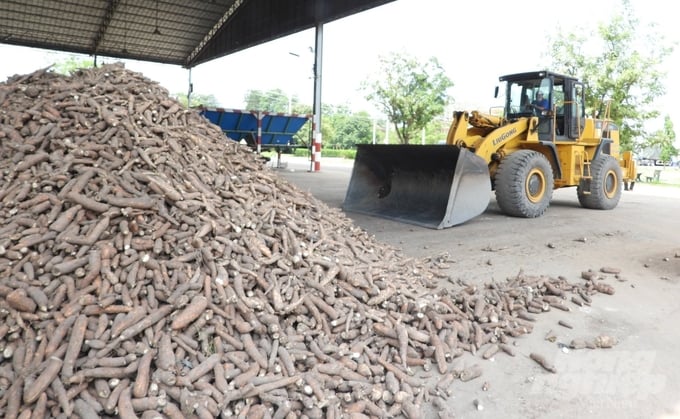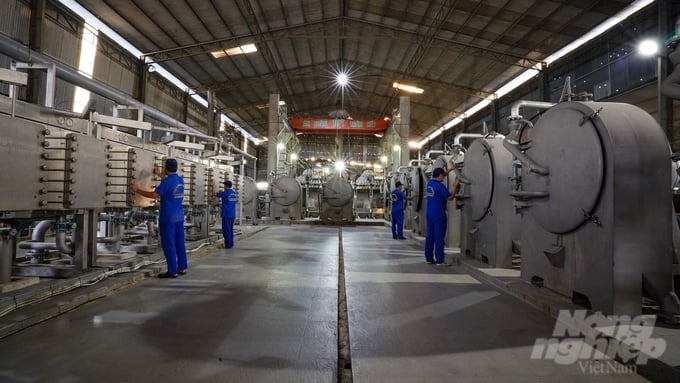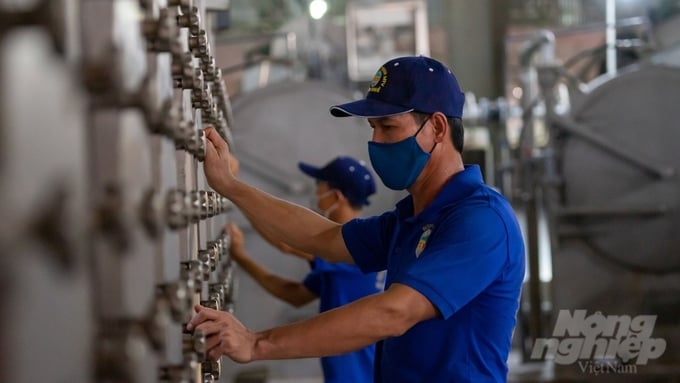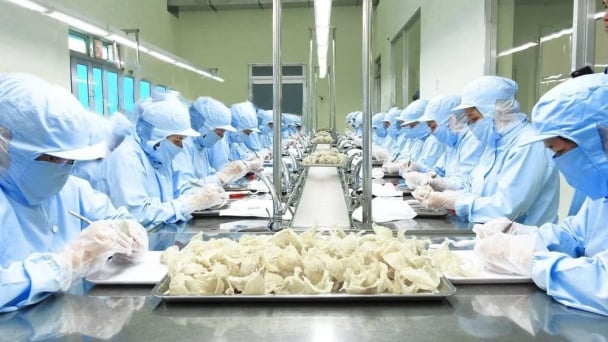May 14, 2025 | 18:06 GMT +7
May 14, 2025 | 18:06 GMT +7
Hotline: 0913.378.918
May 14, 2025 | 18:06 GMT +7
Hotline: 0913.378.918
Tay Ninh is considered the "capital" of the cassava starch processing industry for export, with over 65 processing factories, mainly Vietnamese enterprises, contributing to helping Tay Ninh account for over 50% of the country's output.

Tay Ninh is considered the "capital" of the cassava starch processing industry for export nationwide. Photo: Tran Trung.
According to Tay Ninh, cassava processing enterprises faced many dangers during cassava mosaic disease, followed by the COVID-19 outbreak. Stable production, technological innovation, quality improvement, and market diversification are the keys to overcoming difficulties for the cassava industry, creating a foundation for the future.
Starting from a small handmade noodle factory, Dinh Khue Company Limited in Suoi Day commune (Tan Chau district, Tay Ninh province) has grown to become one of the large-scale factories in the area. Tay Ninh. With modern advanced technology according to European standards, Dinh Khue tapioca starch products have met food safety standards in Vietnam and internationally. In the context of many cassava businesses facing many difficulties, Dinh Khue is one of the bright spots contributing to keeping export turnover stable, enhancing the value of Vietnamese cassava in domestic and foreign markets.

View inside Dinh Khue's cassava starch factory. Photo: Tran Trung.
Visiting Dinh Khue's cassava starch factory right when the company started to produce a new crop, looking at farm trucks filled with fresh cassava tubers from everywhere pouring into the factory shows that despite facing many difficulties, the company has been overcoming them. The proof is that Dinh Khue still receives many orders from traditional partners in China and new partners from demanding markets such as Japan and the EU.
Mrs. Nguyen Thi Khue, Director of Dinh Khue Company Limited, said that before 2018, the company mainly used Korean technology for production. Facing the increasing quality demands of importers, the company boldly changed the entire machinery system to German and Swedish technology and standardized products according to international standards. Thanks to the solid investment, the company's products meet strict food hygiene and safety requirements, whiteness, moisture, impurity content, and market regulations.

Dinh Khue Company changed the entire machinery system to German and Swedish technology and standardized products according to international standards. Photo: Tran Trung.
According to Mrs. Khue, China is still the primary export market of Vietnam's cassava industry. This market is no longer easy-going; changing thinking, applying technology, and standardizing product quality is inevitable. "With production levels according to international standards, we are not afraid of any market, and that is why our products have been exported to Japan, the EU, and the US to reduce dependence on one market and enhance product value," Mrs. Khue shared.
Mrs. Khue added that to stabilize production, with a consumption capacity of 280 tons of fresh cassava/day, the company soon joined hands with the government and farmers to build raw material areas. Accordingly, in addition to purchasing from individual producers, Dinh Khue cooperates with the government, especially associations and unions such as farmers, local women, and cooperative groups, aiming to provide seedlings, fertilizer, technical support, and cover all products. That ensures Dinh Khue always has a clean, abundant source of input materials to ensure the production process.
At the same time, the cassava starch processing industry is one of the industries at risk of causing environmental pollution. In fact, in recent times, many factories have been fined or even forced to stop operating. The production trend of shifting from "brown" to "green", clean food has become a global trend, and for the cassava starch production industry in general, Dinh Khue is no exception.

Dinh Khue pays special attention to food hygiene and safety testing. Photo: Tran Trung.
The entire radius of the area around the manufacturing plant does not have typical industry odors. Tapioca starch products branded "Ba Đồng Tiền" and '"Năm Đồng Tiền" of Dinh Khue meet strict quality requirements according to ISO 9001:2008 standards and ensure food hygiene and safety according to ISO 22000:2005 standards; TCVN 5603:2008; HALAL; is trusted by large domestic companies and corporations (Vedan, Ajinomoto, Miliket, and domestic food processing enterprises (cakes, pellets, modified flour, instant noodles, noodles, shrimp chips, spices, malt...) used in the country.
Besides the domestic market, Dinh Khue exports to China, some Asian countries, the United Arab Emirates, the US, the EU, and Japan... with an average revenue of over VND 400 billion/year. Stable revenue growth helps Dinh Khue ensure jobs and income for workers and positively contributes to the local budget.
Mr. Nguyen Dinh Xuan, Director of the Department of Agriculture and Rural Development of Tay Ninh province, assessed that not only Dinh Khue Company Limited but the majority of cassava processing enterprises in Tay Ninh province have reached the level of processing and equipment and technology equivalent to the world's, proving that the world's most modern machinery and equipment are present in Tay Ninh.
Translated by Tuan Huy

(VAN) Japan's efforts to lower the price of rice through the release of its stockpile may finally be making some progress, albeit at a snail's pace.

(VAN) U.S. tariffs are not only a 'shock', but also an opportunity for Vietnamese businesses to renew their mindset toward comprehensive development.

(VAN) As Bac Giang lychee enters the harvest season, Minister Do Duc Duy expects that the fruit will contribute greatly to agricultural exports due to standardized production and deep processing.

(VAN) Consumers have shown a preference for free-range eggs, but those farming systems are more vulnerable to biosecurity risks like bird flu.
/2025/05/09/5701-1-184335_301.jpg)
(VAN) Vietnam’s eel exports nearly doubled thanks to a mud-free farming model, opening up new prospects while still facing numerous barriers related to international standards.

(VAN) Minister Do Duc Duy warned that if production is not professionalized and supply chains are not transparent, the U.S. market could become a growth bottleneck.

(VAN) Delegating surveillance responsibilities to local authorities is a cost-saving and efficiency-boosting measure that removes a key bottleneck for enterprises, according to Director General Duong Tat Thang.